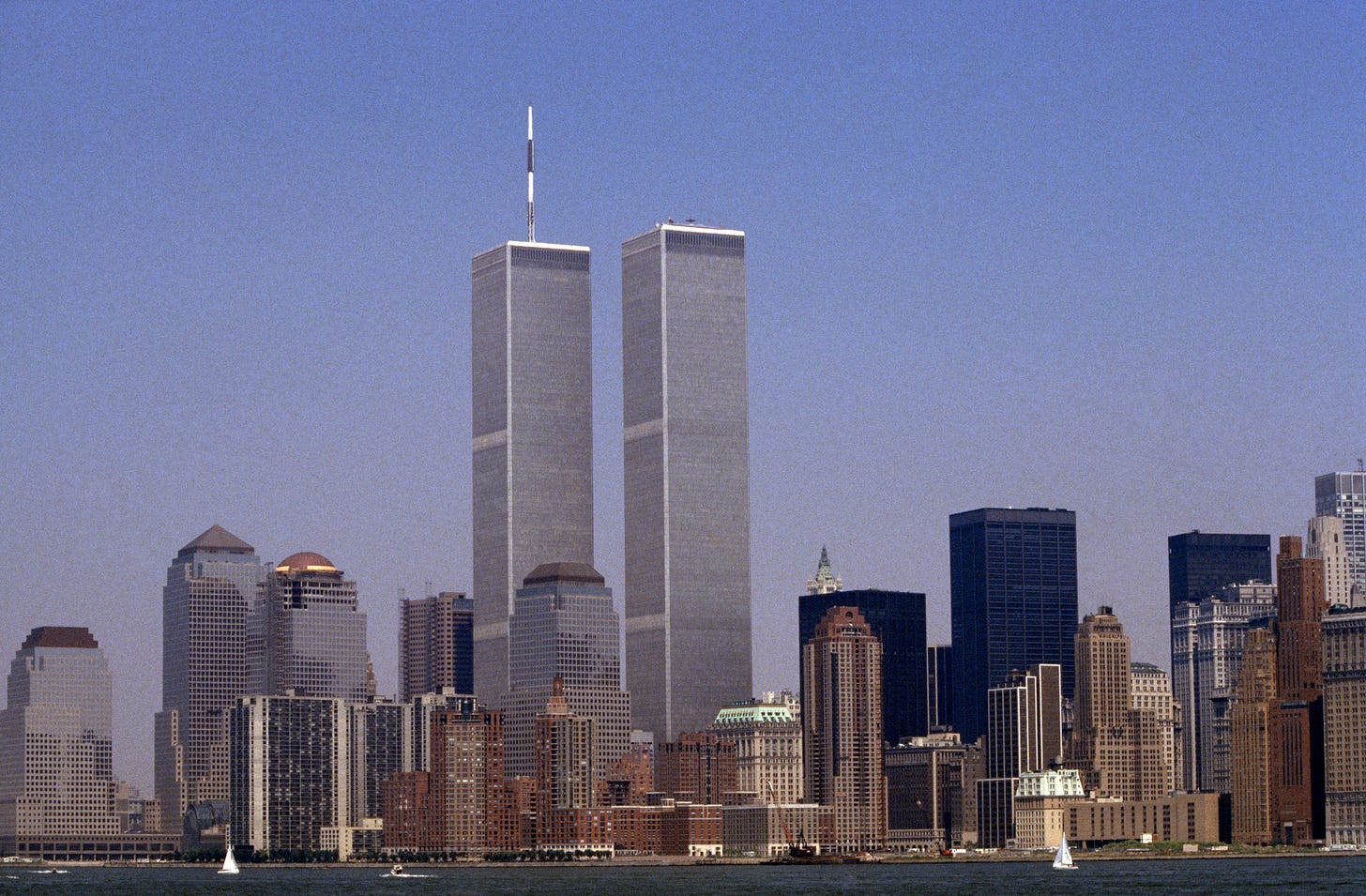9/11 Is History Now
The leaves that are green turn to brown
There is now, at last, an entire generation of adults who have no functioning memory of September 11th, 2001. We simply had to age into that inevitability. Cataclysms have a way of cleaving time. You either remember Pearl Harbor, the JFK assassination, the King assassination, or you don’t. I fall into the latter category; as a millenial, thirty-three now, I have to mark 9/11 as the moment any lingering innocence was lost. Any child living in New York then must.
What can I communicate to those who didn’t live through that day? How can I describe the fear? Having lived in New York for a hurricane and a pandemic, I can say that I will never again be as afraid as I was on that day. Perhaps it was my age then—eleven versus twenty-three (Sandy) and thirty (Covid-19). Perhaps it was because my father, who passed away recently, had an office in the World Trade Center. Perhaps it was because my mother had an office at 26 Federal Plaza, a short walk north. Perhaps it was the physicality of it all—the endless trail of black smoke over Brooklyn, the galactic dust cloud downtown, the bodies in shadow plummeting to the earth.
Perhaps it was because all of it was so condensed. One day, two hours, for history to irrevocably change.
I was at a good age for terror. I was young enough to have little agency in my life and old enough to understand all of it. I came home from school to watch the towers collapse, live, on television. Before then, I remember the flummoxed middle school principal telling us a plane had flown into the Eiffel Tower before quickly, to titters, correcting himself. When my mother showed up at the auditorium, one of the very last people to make it over the Brooklyn Bridge in her car before all the East River crossings were shut down, one classmate said happy birthday to me. It wouldn’t be my birthday for six weeks but I knew what he meant.
The overriding fear of that time was that the Twin Towers were just the beginning. More hijacked planes would slash through the sky. More bombs would explode. I expected the subway tunnels to erupt. I expected an invasion, a land war. No day felt more like the intrusion of unreality, some manic script doctor at work. This was the stuff of summer blockbusters. I was supposed to care about little league and anime— not this, not the fire in the sky.
The flags were everywhere. I lived in a neighborhood of cops, firefighters, and sanitation workers. I lived in a neighborhood where streets would be renamed for the dead. I lived in a neighborhood that wanted to go to war. I also lived in a neighborhood of immigrants from the Middle East. However unsettled I was, they would only know more pain—the revanchist turn was here, and all foreigners were suspect. The police descended on the mosques. The children of the Arab grocers, born and raised here, were now regarded as enemy combatants. Patriotism curdled rapidly—within days, within hours—into the venomous jingoism that would define the rest of the decade.
We were only off from school for one full day, that Wednesday. In retrospect, I find this somewhat remarkable. But there was logic to charging into the future. Parents had to go to work and children had to assume their dazed routines. The baseball season resumed on September 17th. I was in seventh grade, soon to turn twelve, and there were many thousands in New York like me who didn’t quite know what to do with themselves. The parents couldn’t conceal their own horror. The news spoke of nothing else. Beams of light shot up from where the World Trade Center used to be; it was Ground Zero now, which served as a reminder that wars were to come.
As a child, I went up several times to the observation decks of the Twin Towers. I went with my father, who could tolerate heights enough to take the high speed elevator there but preferred not to wander out to the edge. My mother had a birthday party at Windows on the World, the restaurant and entertainment complex occupying the top two floors of the North Tower. I was too young to know the resentment New Yorkers of the 1970s had harbored toward the monoliths in their midst. The towers, in their early days, were considered charmless monstrosities, permanently violating an iconic skyline. That sentiment eventually faded. By my childhood, the Twin Towers were emblems of the resurgent New York, spotted in all the movies, television shows, and cartoons set here. They were my favorite buildings, scrawled on countless pieces of construction paper when I was a grade schooler. I was drawn to their starkness, their inevitability, the way they cut against a deep blue sky. I sketched and sketched. The air at the top, I remember, was very cold and clear.



Beautiful writing! I had breast cancer and compared the towers to my breasts and one editor said: never do that!
Sure would be nice if our government would stop kissing Saudi Arabia's ass. It's peak America that we invade Afghanstan and destroy Iraq because of what Saudis did to us.
https://www.nbcnews.com/news/us-news/9-11-families-president-biden-don-t-come-our-memorial-n1276138
The 9/11 families don't want Biden around after sucking up to the brutal, American journalist murdering regime when Biden said he'd make the pariahs.
I don't blame them.